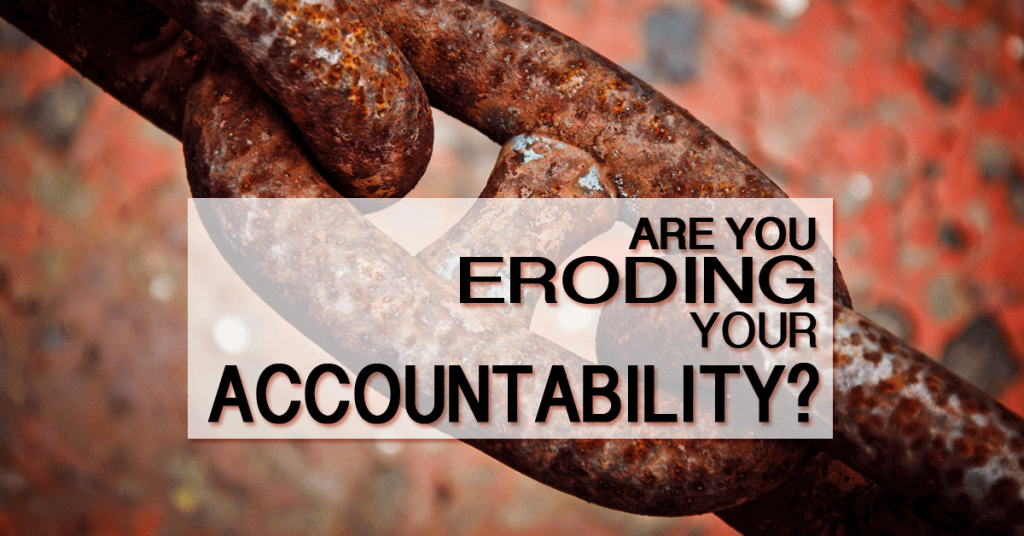 I facilitated a discussion on accountability recently with a group of 11 leaders. We talked about how a high-accountability team impacts an organization vs a low-accountability team. They made a lot of good points during the discussion and then they began talking about the challenges with firing poor performers. Interestingly, they immediately began to complain and blame legal and human resources for their inability to remove poor performers from their teams. In other words, during their discussion on accountability and the behaviors they don’t want to see in others, they began displaying those same behaviors.
I facilitated a discussion on accountability recently with a group of 11 leaders. We talked about how a high-accountability team impacts an organization vs a low-accountability team. They made a lot of good points during the discussion and then they began talking about the challenges with firing poor performers. Interestingly, they immediately began to complain and blame legal and human resources for their inability to remove poor performers from their teams. In other words, during their discussion on accountability and the behaviors they don’t want to see in others, they began displaying those same behaviors.
The first step to building an organization with high accountability is for the leader to look in the mirror. Self-awareness is a core competency of emotional intelligence and one I often see lacking when it comes to accountability. People are quick to point out where others fall short, but often miss those same behaviors in themselves.
Behaviors That Undermine Accountability:
1. Blame
When was the last time you blamed another person or team for a failure you were part of rather than examining the role you or your team played? Not only is blaming others a waste of time, it damages relationships. Instead of blaming others, identify what went wrong and what can be done to ensure that it isn’t repeated. Always look at how you and your team may have contributed so you can make changes.
2. Excuses
When was the last time you made an excuse for poor performance or a missed deadline? You don’t hear excuses on high-accountability teams. On those teams, when people make mistakes, they own them. People make excuses to avoid responsibility and looking bad. The thing is, most people see right through excuses, which not only makes you look bad, but damages your credibility.
3. Victim mindset
When was the last time you found yourself stuck in the victim mindset? Most people experience self-pity at some point or feel like the world is conspiring against them. Accountable leaders don’t stay there long and certainly don’t drag their team down with them. If this is a struggle for you, it’s time to build your resilience. Find ways to bounce back and get out of the victim mindset and back in the game.
4. Derailed by Obstacles
When was the last time you allowed obstacles to derail you? Accountable leaders and teams know their goals and relentlessly pursue them in spite of obstacles. Leaders who give up have teams who give up. The leaders with high-accountability teams identify the obstacle and ask how they are going to get around it. If that solution doesn’t work, they try another.
These are just some of the things you’ll see in organizations that lack accountability. Leaders who want to develop unshakable accountability in their teams need to begin with clear expectations and then model exactly what they want to see. If you don’t want your team blaming others, making excuses, getting stuck in the victim mindset, and giving up when faced with obstacles, you can’t do any of these things either.
If you’d like to develop your or your team’s accountability contact Dr. Heather Johnson to discuss how to bring a custom workshop to your team.
NEW: Explore our selection of Online Courses and Webinars
—————
 Dr. Heather Johnson is a nationally recognized speaker with extensive experience developing leaders. With a doctorate in Psychology and over 30 years of business experience, she works with leaders to quickly identify individual and team performance obstacles and develops customized solutions that lead to rapid change and lasting results. Heather facilitates public and in-house workshops that deliver personalized, practical, and immediate results. Some of her most requested topics are: Influence, Emotional Intelligence, Team Building, Communication, and Strategic Planning. For more information call contact us here or call 651-210-6021.
Dr. Heather Johnson is a nationally recognized speaker with extensive experience developing leaders. With a doctorate in Psychology and over 30 years of business experience, she works with leaders to quickly identify individual and team performance obstacles and develops customized solutions that lead to rapid change and lasting results. Heather facilitates public and in-house workshops that deliver personalized, practical, and immediate results. Some of her most requested topics are: Influence, Emotional Intelligence, Team Building, Communication, and Strategic Planning. For more information call contact us here or call 651-210-6021.


